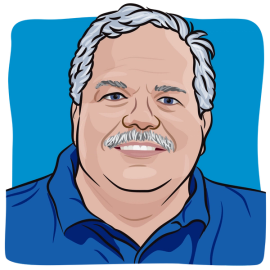- About Us
- Advertise / Support
- Editorial Board
- Contact Us
- CancerNetwork.com
- TargetedOnc.com
- OncLive.com
- OncNursingNews.com
- Terms & Conditions
- Privacy
- Do Not Sell My Information
- Washington My Health My Data
© 2025 MJH Life Sciences™ and CURE - Oncology & Cancer News for Patients & Caregivers. All rights reserved.
It’s OK to Stay in Touch With Cancer

Joe Bullock was diagnosed in May of 2018 with stage 3b colorectal cancer after a routine colonoscopy at age 50. During the colonoscopy his GI doctor at Duke Cancer Center found two polyps and a 1Ocm tumor in my colon. He had surgery to remove the tumor, and the surgeon reconnected his colon, and he had 40 lymph nodes removed. Three of those polyps tested positive for cancer.
Even though I’ve had no evidence of cancer for the last five years, I still stay up to date about the latest developments for the disease.
I have learned over the years as a cancer survivor that it’sOK to stay in touch with your disease. I have grown not to fear the unknown as it pertains to my survivorship. Of course, it is still scary because it can be a bit of a “free fall” at times, but I think being awell-informed patient takes away some of that fear.
In a few months I will be five years NED (No evidence of disease) from my stage 3b colorectal cancer diagnosis. I still live with the fact that I could very well have a recurrence of my cancer in the future. Being well informed about my disease is the best defense against cancer.
When I was finished with treatment and learned that no more cancer was found in my body, it would have been easy to just cut and run because the last thing I wanted to do was think about my cancer or talk to anyone about it.
I think the only saving grace at the time was that I was participating in a therapy group for cancer survivors. There was a point when I had talked about leaving the group. My therapist approached me after a group session one night and encouraged me to remain in the group. She said that I am going to need ongoing support as you navigate through survivorship.She told me that my story will continue to encourage other survivors and bring hope to the group.
I started to realize that even though I was finished with the treatment of my cancer,the real work had just begun. I have now become a better-educated and more-informed patient about my cancer. I did this by listening to podcasts, reading various blogs and articles and following a couple of organizations that provided helpful information about my cancer. I had to pace myself with this learning, because the information overload can become overwhelming at times.
Learning about the disease did not change the way my disease was treated, but I was able to bring up a couple of studies and treatments to my medical team. One was a recently developed ctDNA blood test to help to identify a possible relapse of my cancer earlier. I was one of the first cancer patients at my cancer center to use the test a couple of years ago. You know when you have a great medical team when they listen to you and consider your suggestions about your treatment plan. It tells you that they consider the value of the patient's voice — thatwas very reassuring for me.
I think a lot of patients with cancer think it’s the responsibility of their oncologist to educate them about their disease. It’s actually only their job to treat your disease, not to educate you about it. This is why it's so important for patients to educate and advocate for themselves. I am currently working as an onboarding specialist for a colon cancer organization.
I have to constantly remind people that it's OK to talk to others about their disease. They fear that the more they learn or have discussions about their disease the more overwhelmed they will become about it. Sometimes they just don’t want to read or talk about their cancer. I let them know that to me, knowledge is power in the fight against the disease. I, myself, have had to find a balance so I don’t get overwhelmed but continue to gain an understanding. If I should have a recurrence of my cancer, I will be better prepared for the fight.
Staying in contact with my peers in the cancer community has been extremely helpful to educate myself about my cancer. I encourage other survivors to do the same because it has brought me the most accurate information. A few of these individuals have become lifelong friends, even though I may have only met them on social media. Over the years I have been able to travel to a few cancer-related conferences and work on a few advocacy projects. It has given me the great opportunity to meet up with a few of my fellow cancer survivors. I know for a fact that patients' lives have been saved because of the conversations they have with other survivors that have helped them gain a better understanding about their cancer.
Over the last five years, I have gained a lot of insights about my cancer from asking questions to the medical team caring for me, researching my disease on my own and getting advice from my fellow cancer survivors. Staying in touch with my cancer in this way has helped me be a well-informed patient and I can confidently use my voice to support others in the fight. For me, it has taken away some of the fear I have about being diagnosed with the disease.
For more news on cancer updates, research and education, don’t forget to subscribe to CURE®’s newsletters here.
Related Content:



